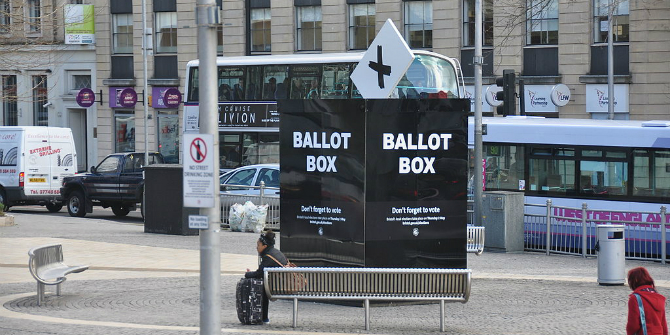Following Brexit, the UK became a WTO member in its own right. Is plurilateralism the way forward for Global Britain’s e-commerce ambitions, ask Alexanne Dieu and Samuel Richardson (LSE)?
In 2017, the road to the 11th WTO Ministerial Conference in Buenos Aires was bleak. Between Donald Trump’s hawkish approach to trade, including his withdrawal from the Trans-Pacific Partnership and request to renegotiate NAFTA, and the UK’s departure from the EU single market with the political and economic turmoil it entailed, overall expectations of what would be achieved in Buenos Aires were low.
MC11, however, defied expectations in unforeseen ways. Although substantial progress on old issues was limited, Members showed a desire to expand trade liberalisation to new topics. Joint Statement Initiatives (JSI) were made in the areas of investment facilitation for development; micro, small and medium-sized enterprises; and crucially, electronic commerce.
Following Brexit, the UK became a WTO member in its own right and will negotiate on its own account. The question is: what are the advantages and risks of a plurilateral approach to e-commerce for Global Britain?

E-commerce negotiations have the potential to reinvigorate the WTO
E-commerce is a fresh topic. Although discussions on e-commerce began in the WTO as early as 1998 when Member States decided to impose a moratorium on customs duties for electronic transmissions, the 2017 JSI officially opened negotiations on the topic. Compared with the Doha agenda which consisted of ‘leftover’ topics from the Uruguay Round, the e-commerce initiative at Buenos Aires provides a brand-new agenda for WTO negotiations going forward. Therefore, it avoids the diplomatic baggage around topics that have previously been haggled over during the decade of the Doha Round.
UK support for an agreement at the WTO would enable Global Britain to have a say in what is a particularly strategic topic, both economically and politically. Economically, in 2016 the global digital economy was worth $11.5 trillion, equivalent to 15.5 per cent of global GDP. Crucially, it had grown 2.5 times faster than global GDP over the last 15 years, had almost doubled in size since 2000, and is expected to continue following an exponential growth trajectory. The global COVID-19 pandemic has only accelerated its growth by boosting online sales and entertainment like never before.
Politically, governments care about regulations concerning the digital world. Australia recently passed a digital news law making Facebook and Google pay for news content on their platforms, and in 2018 the European Union implemented the GDPR framework to ensure consumer data privacy. At the WTO, Global Britain could help shape international law on governmental regulation of e-commerce.
The UK would be negotiating with mostly like-minded countries: e-commerce negotiations take on the very specific form of WTO plurilateral negotiations, which means they don’t include all WTO members. Rather, they only include those Members who wish to make actual progress on negotiations. Crucially, it includes key digital economies such as China and Brazil that are not OECD members. However, Members unwilling to commit to an agreement can drop out and are not able to hold other Members back with the Single Undertaking norm (‘nothing is agreed until everything is agreed’). This can serve to bridge the rift created between developed and developing WTO Members and the kind of hostage-taking practices that shaped the Doha Development Agenda negotiations in the WTO: if developing country Members are unwilling to commit to an agreement, they can simply opt-out instead.
Finally, at the WTO Global Britain could cultivate its “special relationship” with the US. The election of Joe Biden as President of the United States provides some reasons to hope for improved multilateral relations. In three months of presidentship, President Biden has already re-joined the Paris agreement on climate change and has lifted US opposition for the appointment of Dr. Okonjo-Iweala as Director-General of the WTO. With the US back in a global leadership position, negotiations on e-commerce have the potential to deepen and broaden trade liberalisation, and Global Britain could be a key actor in promoting renewed WTO solutions.
The downside risks for WTO-based plurilateralism
Despite the potential for e-commerce talks to reinvigorate a lethargic WTO, significant risks of negotiation failure make the plurilateral approach in the WTO less attractive for Global Britain. First, contentious US/China structural differences over the strategically valuable e-commerce industry significantly increase the risk of JSI failure. Whereas the US produces countless digital content and platform firms, many Chinese e-commerce companies specialise in buying and selling physical goods on online marketplaces. Consequently, American negotiators push for greater ‘behind-the-border’ regulation such as intellectual property rights and data access, whereas Chinese diplomats focus on ‘at-the-border’ regulation including e-signatures and customs duties. As each country has substantially different digital industry interests to protect in negotiations, wide structural differences reduce the likelihood of an e-commerce agreement.
Second, as WTO negotiations are being held on an open plurilateral basis, UK participation in the WTO e-commerce agreement risks being undermined by ‘free-rider’ concerns. A country can ‘free-ride’ when it does not sign up to a plurilateral agreement but benefits from it when the commitments of those that do are extended to them on an MFN (most favoured nation) basis. If too many free-riders benefit at the cost of participant countries, then ultimately the costs outweigh the benefits for the signatories and negotiations collapse. Given that India, with the world‘s second-largest population, has already pulled out of e-commerce talks, the free-rider issue clearly poses a threat to negotiation success.
Third, technical topics such as e-commerce are arguably better suited to negotiation in norm-creating institutions rather than the WTO. Policymakers must therefore question whether the WTO is the most suitable institution to realise the ambitions of Global Britain. Wolfe (2010) argues that contested, dynamic, regulation-heavy, technical topics require a greater level of ‘consensual understanding’ where negotiators must first establish shared norms regarding the key issues. However, by design the WTO is primarily a bargaining-based institution, where issue-linkage and diffuse reciprocity help create relatively balanced outcomes for all parties. Therefore, negotiations on e-commerce may be ‘doomed to fail’ in the WTO context, and would be perhaps better suited to discussions in normative institutions. The OECD-G20 Inclusive Framework on BEPS, the effort to reduce Base Erosion and Profit Sharing in taxation, to which President Biden’s administration submitted their global tax reform proposal only last week, is setting a precedent for how highly technical global issues being negotiated away from the WTO.
Risks to the WTO e-commerce negotiations are particularly salient to UK policymakers in determining whether a WTO-based approach best reflects Global Britain. The e-commerce negotiations are the WTO’s ‘poster-child’ and stand as an indicator of WTO-based multilateralism’s future. If an agreement is signed, then this success will be viewed as heralding a fresh start for multilateralism with Global Britain leading the charge. However, if negotiations fail, then countries that are eager to realise digital trade liberalisation will likely seek to negotiate alternative e-commerce deals in other forums. Such a failure of the e-commerce negotiations could represent the start of a slow but irredeemable shift away from WTO – based multilateralism. If this is the case, Global Britain strategy may find more success within the increasing number of preferential trade agreements (PTAs) or even plurilateral negotiations at the OECD.
This post represents the views of the author(s) and not those of the Brexit blog, nor of the LSE. This blog post introduces is part of a series on digital trade that emanates from an extended and detailed simulation of the current WTO negotiations on e-commerce by LSE Masters students in the International Relations Department.






